13 Evidence-Based Health Benefits of Flax Seeds
What are Flax Seeds
If you follow latest health food trends, you’ve probably heard of flax seeds, also known as common flax or linseeds.
No wonder the Latin translation of ‘flax’ is ‘useful’.
Flax has long been used in the industrial and healthcare fields as well as in cosmetology.
Stems of flax are processed into fibers, which is the raw material for linen fabric.
Flax seeds, meanwhile, are used as a health food, which has been scientifically proven to be beneficial for the human health.
Thanks to the fact that flax seeds are rich in omega-3 fatty acids, fiber, lignans, and protein, as well as many other plant compounds, flax seeds are effective in preventing heart diseases, diabetes, and even cancer.
Studies also show that flax seeds promote weight loss (1, 2, 3, 4).
The combination of all the healthy nutrients contained in flax seeds make them truly unique.
In fact, not many foods can compete with flax seeds in terms of health benefits.
Another great thing about flax seeds is that you can easily incorporate them into your diet.
Flax seeds preserve most of their health benefits when consumed in the raw ground form.
However, most people would probably find it easier to consume them in the form of flaxseed oil as a dressing for salads and other meals.

Nutrition Facts
Flax seeds contain 534 calories per 100 grams, consisting of 18% protein, 42% fat and 29% carbs (5).
Flax seeds contain 1.6mg of thiamin (vitamin B1) per 100 grams, which is 110% of the daily value.
Flax seeds are also rich in magnesium (392mg) and manganese (2.5mg), 98% and 124% of the daily value, respectively.
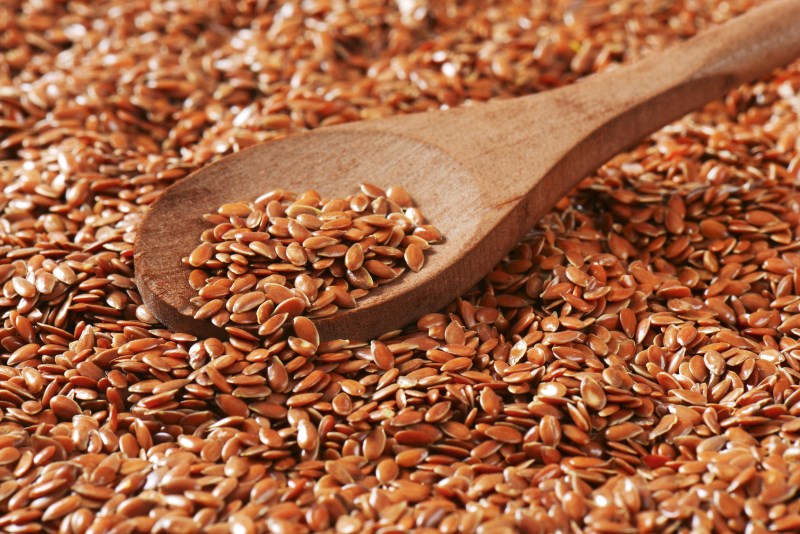
Carbs and Fiber
There are only 1.5 grams of digestible carbs per 100 grams of flax seeds, which means they are great for low-carb diets.
Flax seeds are rich in fiber: two tablespoons of these seeds consist of about six grams of fiber, which is 20% of the daily value (6).
Flax seeds contain 20-40% of soluble fiber and 60-80% of insoluble fiber.
The soluble fiber content of the seeds prevents the human body from absorbing fat and cholesterol that comes with food (6).
Both the soluble and insoluble fiber contents of flax seeds improve the functioning of the digestive system.
The soluble content of flax seeds also normalizes blood sugar and cholesterol levels (7).
The fiber content of flax seeds also serves as food for friendly bacteria found in the gut, which helps eliminate toxins from the body (8).
Flax seeds can also serve as a natural laxative.
For this purpose, roasted flax seeds should be ground and mixed with water.
This way, the soluble fiber in the seeds becomes very thick.
In fact, the dietary fiber contained in flax seeds helps reduce the risk of diabetes, regulates body weight, and prevents constipation (9, 10).
Brief summary: flax seeds are very rich in fiber, both soluble and insoluble.
It makes flax seeds beneficial for your digestive system, regulating blood sugar and cholesterol levels and reducing the risk of various diseases.

Protein
100 grams of flax seeds contain 18% protein, which makes it one of the richest sources of protein among seeds.
The amino acid content in flax seeds, meanwhile, could be compared to that in soybeans.
However, because flax seeds are a rather poor source of the amino acid lysine, they cannot be used as the sole protein source of a diet (11).
Flax seeds are rich in the amino acids arginine and glutamine, which are essential in preventing heart diseases and help boost the immune system (12).
The proteins contained in flax seeds help protect your body from fungal infections, bad bacteria, inflammation, high blood sugar and cholesterol levels, as well as type 2 diabetes (13).
Brief summary: flax seeds are a rich source of protein (18%) and essential amino acids, but they cannot be used as the sole protein source in the diet.
Flax seeds protect and boost the immune system.
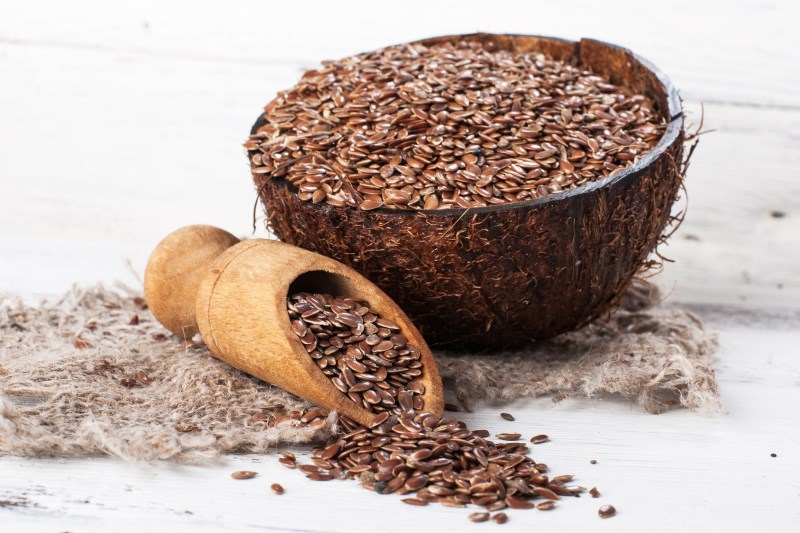
Healthy Fat
Flax seeds contain 42% fat, the content of which is composed of 73% polyunsaturated fatty acids and 27% saturated and monounsaturated fatty acids (14).
Polyunsaturated fatty acids (omega-3 and omega-6 fatty acids) are essential for your body, because it cannot produce them on its own (15).
Saturated fatty acids, on the other hand, may increase the risk of type 2 diabetes, as well as raise total blood cholesterol and low-density lipoprotein (LDL) levels (15).
However, since there are more polyunsaturated fatty acids than saturated fatty acids in flax seeds, they are perfectly safe to eat every day.
In fact, flax seeds are the second richest food source (after chia seeds) of omega-3 fatty acid ALA, which is used by the human body for energy, helps prevent heart disease, and lowers blood pressure (16).
The ALA fatty acid improves the condition of your skin and hair because it provides the body with essential fats and b-vitamins, which eliminate skin dryness and flakiness (17).
The ALA fats help treat acne, rosacea, and eczema.
Flax seeds also improve eyesight because the ALA fatty acid reduces eye dryness (17).
Flax seeds are one of the richest sources of omega-3 fatty acids.
However, they are not as good as fish oils in terms of delivering omega-3 to the body because the fats in flax seeds need first to be converted into EPA and DHA in the human body (18, 19).
Because flax seeds are so rich in omega-3, they have a lower ratio of omega-6 to omega-3, meaning that by consuming flax seeds you reduce the risk of some chronic diseases (20).
Brief summary: flax seeds have a high content of healthy fat (42%) and are one of the richest sources of omega-3 fatty acids, which prevent heart diseases and protect your body from various other illnesses.

Vitamins and Minerals
Flax seeds also provide the human body with a substantial amount of vitamins and minerals.
In particular, flax seeds are a rich source of thiamine (vitamin B1), which regulates the normal functioning of metabolism (21).
Flax seeds are also a great source of copper because 100 grams of the seeds provide 1.2mg of copper, which is so essential for the normal functioning of your body (22).
Flax seeds are rich in magnesium (392mg per 100 grams), which is vital for heart health and metabolism (23).
Flax seeds also serve as a good source of molybdenum, which plays an important role in various biological functions in the human body (24).
Flax seeds can also compete with protein-rich foods thanks to their high content of phosphorus, which is important for bone health and quality of life (25).
Brief summary: flax seeds provide the body with a lot of vitamins and minerals including magnesium, vitamin B1, copper, phosphorus, and molybdenum.

Plant Compounds
Flax seeds also serve as a rich source of plant compounds such as p-Coumaric acid, ferulic acid, cyanogenic glycosides, phytosterols and lignans:
p-Coumaric acid: this organic compound found in flax seeds is a potent antioxidant that helps your body eliminate bad bacteria (26).
Ferulic acid: this phytochemical helps the human body prevent various chronic diseases thanks to its antioxidant properties (27).
Cyanogenic glycosides: this compound makes flax seeds a risky food for people who have problems with the thyroid gland because flax seeds may inhibit thyroid function if eaten in large quantities (28).
Phytosterols: these compounds are commonly found in plant cell membranes and help reduce cholesterol levels in the human body (29).
Lignans: among many other things, lignans are high in antioxidants, regulate hormone levels, and boost the immune system (30).
Opt for brown flax seeds rather than the yellow ones because they are more potent in terms of the antioxidant effects (31).
Brief summary: flax seeds are a rich source of such plant compounds as lignans, phytosterols, p-Coumaric acid, ferulic acid, and cyanogenic glycosides.
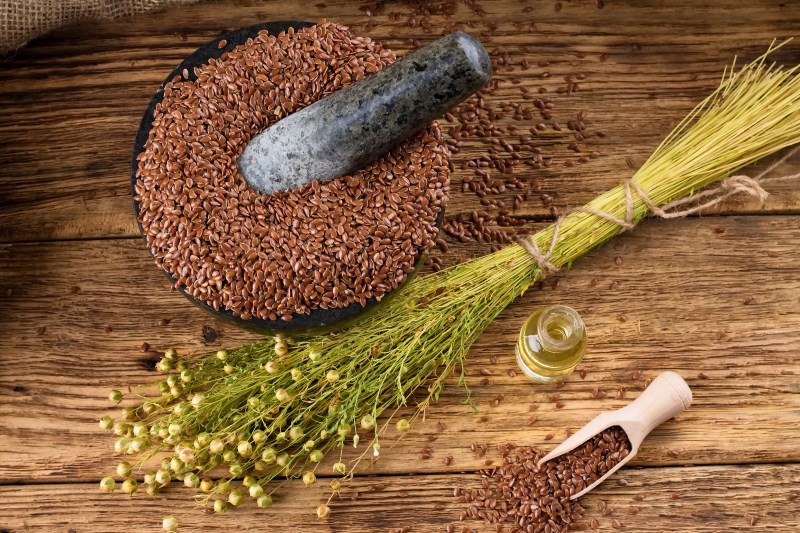
Lignans
Flax seeds are among the richest food sources of lignans in the human diet.
In fact, flax seeds contain up to 800 times more lignans than some of the other dietary sources (32).
Apart from their high antioxidant value, lignans reduce LDL (bad) cholesterol levels and regulate hormone levels in the human body (33).
Thanks to their property to bring down the amount of fat and glucose in the blood, lignans boost the immune system and reduce the risk of heart diseases and metabolic syndrome (33, 34).
Lignans are similar to the female sex hormone estrogen because they help relieve menopausal symptoms.
In fact, women who include lignans in their everyday diet significantly reduce the risk of breast cancer (35, 36).
Lignans found in flax seeds help improve prostate health and prevent prostate cancer thanks to their property to inhibit the enzymes involved in the conversion of testosterone to DHT (37).
Lignans also have properties to reduce the risk of colon cancer and inhibit HSD enzyme, which brings down the stress hormone cortisol (38, 39).
Lignans found in flax seeds also help lower blood pressure, prevent the development of diabetes, and reduce inflammation in the arteries (34, 40, 41).
Brief summary: flax seeds offer a wide range of health benefits thanks to their high content of lignans.
Among many other things, lignans improve heart health and help prevent breast, prostate, and colon cancer.
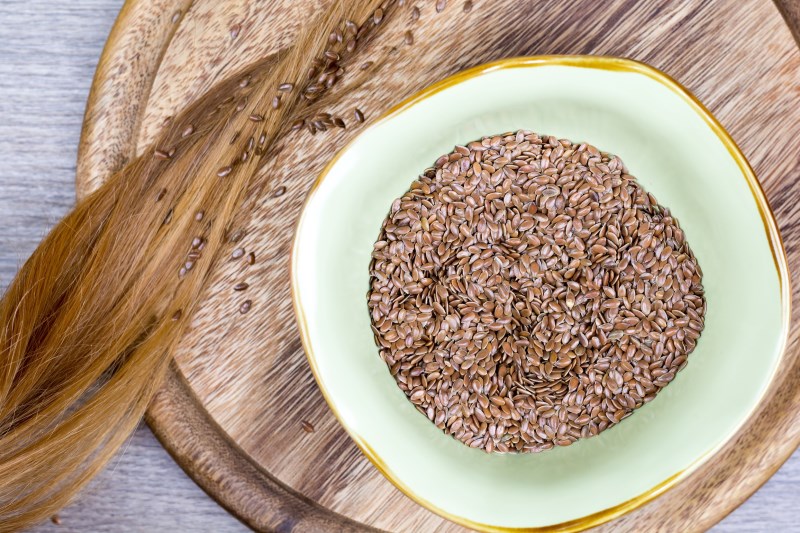
Weight Loss
Flax seeds also contribute to weight loss thanks to their high content of soluble fiber.
Soluble fiber helps suppress hunger and sugar cravings, which could potentially result in weight loss (42).
In fact, if taken regularly, the fiber contained in flax seeds helps reduce body weight by filling the stomach and stimulating receptors that send signals to the brain, informing it that it’s time to stop eating (43).
When combined with a proper weight loss diet, flax seeds help bring down inflammatory processes in the body by 25–46% (44).
Brief summary: flax seeds contribute to weight loss thanks to their high content of soluble fiber, which fills the stomach and stimulates receptors that send signals to the brain, which prevent you from overeating.
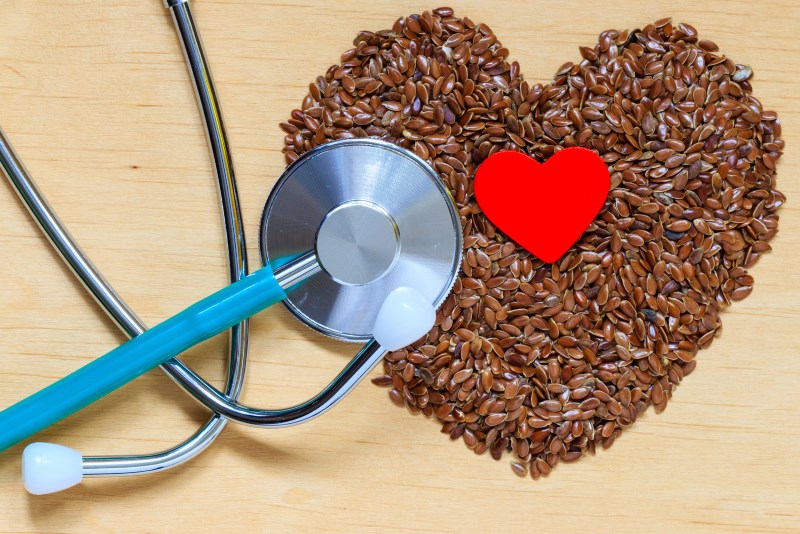
Heart Health
Some studies have proven the health benefits of flax seeds for the heart.
Those benefits for heart health are linked to the high content of lignans, fiber, and omega-3 fatty acids in flax seeds.
Blood Cholesterol
High blood cholesterol is one of the most common causes of heart disease.
The higher the blood cholesterol level, the riskier it is to develop heart disease, have a stroke or a heart attack (45).
Flax seeds are one of the richest sources of lignans, which reduce oxidized LDL (bad) cholesterol levels and regulate hormone levels in the human body.
LDL cholesterol is the main culprit of heart disease (33, 46).
The soluble fiber content in flax seeds prevents the body from absorbing bad cholesterol that comes with food, while proteins in flax seeds reduce cholesterol levels (6, 13).
Phytosterols found in flax seeds help reduce cholesterol levels in the human body (29).
The soluble fiber and lignans found in flax seeds bind with bile acids and eliminate them from your digestive tract, which in turn reduces cholesterol levels (47).
Human studies indicate that everyday consumption of flax seeds lowers cholesterol levels by 6–11%, while the number of LDL particles is reduced by 9–18% (48, 49).
Animal studies indicate that flax seeds also improve the overall composition of blood fats (50, 51).

Omega-3 Fatty Acids
Flax seeds are rich in omega-3 fatty acids, particularly in omega-3 fatty acid ALA (alpha-linolenic acid), which helps prevent heart disease and reduces blood pressure (16).
In fact, flax seeds are the second richest food source (after chia seeds) of ALA, which cannot be produced by your body on its own and has to be delivered to the body with food.
Human studies have shown that daily consumption of ALA reduces the risk of strokes, heart attacks, and another heart diseases.
In fact, there is a 73% lower risk of sudden death from heart disease in people who consume sufficient amounts of ALA (52, 53, 54).
Another human study showed that those who consume ALA every day have significantly lower rates of death from heart disease, compared to people with lower ALA intake (55).
Animal studies have shown that ALA reduces the inflammation processes in the arteries (41).
Although flax seeds are not as good in delivering omega-3 fatty acids to the body as fish oils, they still benefit the heart similar to fish oils, which are so rich in EPA and DHA (18, 19, 56, 57).

Blood Pressure
Flax seeds are more potent than other dietary sources in terms of lowering blood pressure (58, 59).
This is thanks to the high content of omega-3 fatty acid ALA and lignans in flax seeds, both of which help lower blood pressure (16, 34).
Human studies show that each 5 mmHg reduction in the systolic blood pressure (SBP) and each 2–5 mmHg reduction in the diastolic pressure (DBP) means that the risk of stroke is reduced by 11–13%, while the risk of developing heart disease is reduced by 34% (60, 61, 62).
Brief summary: flax seeds are highly beneficial for heart health.
In particular, flax seeds help prevent heart disease, lower blood pressure, reduce bad cholesterol levels, as well as increasing the levels of omega-3 fatty acids.
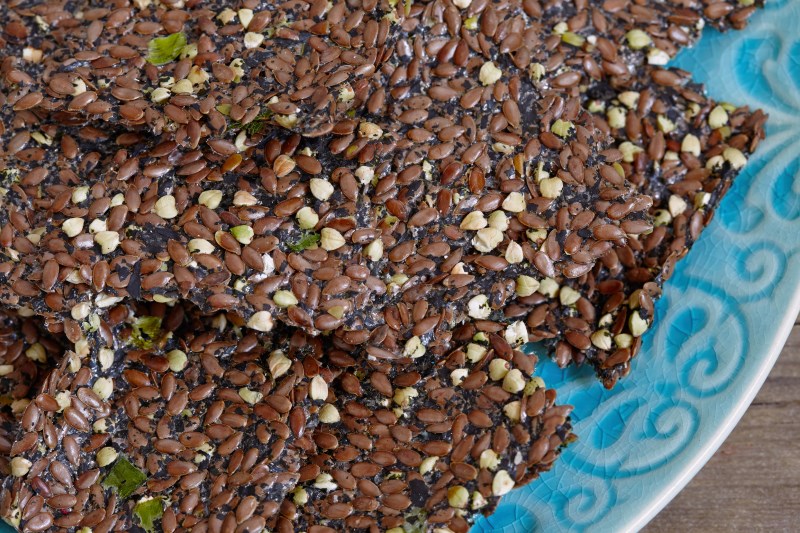
Digestion, Diabetes, and Cancer
Apart from benefiting heart health, flax seeds also improve digestion and prevent diabetes and cancer.
Digestion
Human studies have shown that thanks to the high content of fiber, flax seeds prevent diarrhea and constipation, both of which are common conditions across the United States and Europe (63, 64, 65).
Thanks to the insoluble fiber content found in flax seeds, the seeds can serve as a natural laxative.
For this purpose, roasted flax seeds should be ground and mixed with water.
This way, the soluble fiber in the seeds becomes very thick (66, 67).
Animal studies have shown that the soluble content of fiber in flax seeds binds with water in the digestive tract, which prevents diarrhea (68).
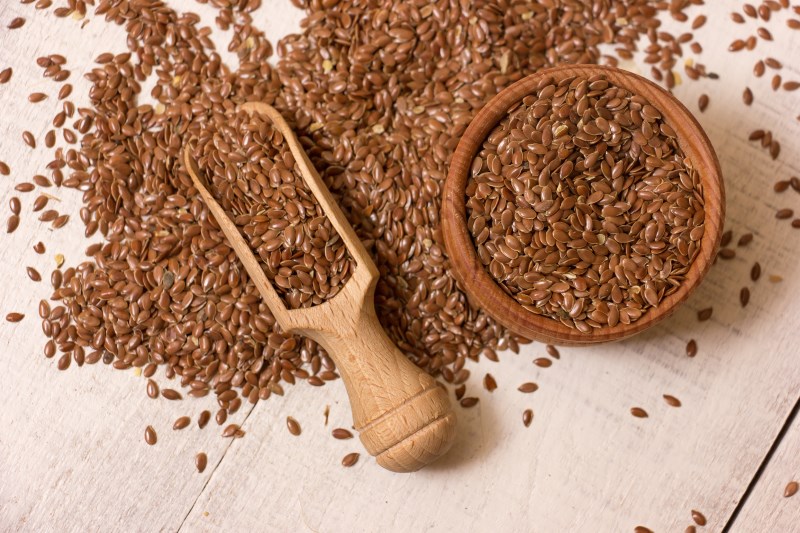
Diabetes
A study has found that taking a tablespoon of ground flax seeds every day for a month lowers fasting blood sugars, triglycerides, cholesterol levels, as well as bringing a significant drop in A1C level (69).
In fact, there was a substantial drop in insulin resistance after 12 weeks of taking flax powder every day.
Thus, flax seeds improve insulin sensitivity in glucose-intolerant people.
However, this is the only study that claims flax seeds could prevent diabetes, while many other studies failed to have found any link between consuming flax seeds and regulating glucose and insulin levels (70).
Although the benefits of flax seeds to prevent type 2 diabetes still require further research, flax seeds are safe to include in diets for people suffering from type 2 diabetes (71).
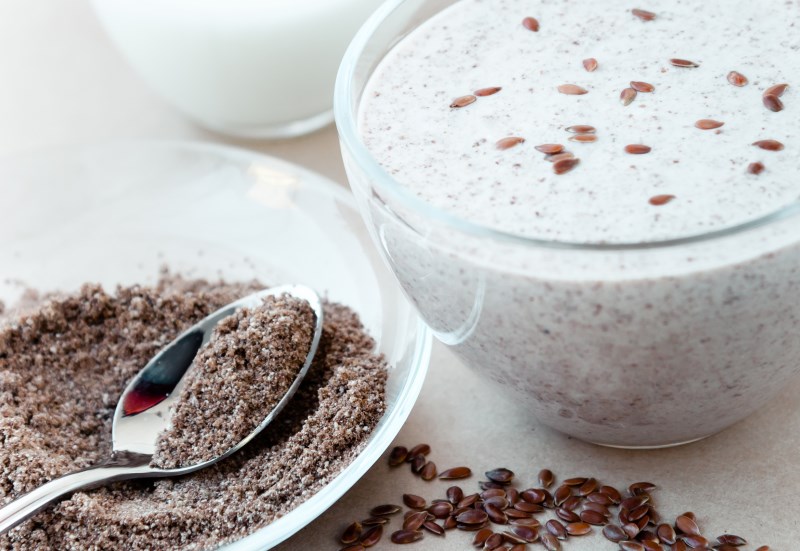
Cancer
Some human and animal studies have found that flax seeds help prevent the development of various types of cancer, including breast, prostate, color, skin, and lung cancer (36, 37, 38, 72, 73).
It’s mainly lignans found in flax seeds that help lower the risk of developing various cancers.
Flax seeds also regulate blood levels of sex hormones, which helps reduce the risk of various cancers (74, 75).
The antioxidants found in flax seeds reduce the risk of skin cancer because they fight free radicals (76).
The anti-inflammatory and anti-oxidant properties of flax seeds also reduce the risk of developing lung cancer (77).
Brief summary: flax seeds improve digestion and prevent diarrhea and constipation thanks to their high content of fiber.
Flax seeds may also help prevent diabetes and lower the risk of developing various types of cancer.
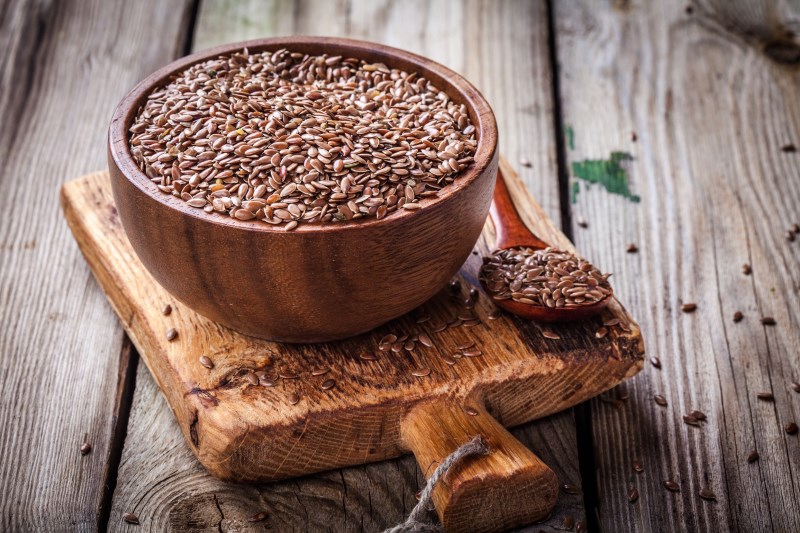
Side Effects and Precautions
Just like almost all other seeds, flax seeds may cause some side effects when eaten in large quantities.
In fact, they may even be toxic (78).
When eaten in moderation, flax seeds usually don’t cause allergies and are well-tolerated by the human body (79).
Cyanogenic Glycosides
This compound, found in flax seeds, makes them a risky food choice for those who have problems with the thyroid gland.
This is because flax seeds may inhibit the thyroid gland function when eaten in large quantities (28).
This, in turn, happens because cyanogenic glycosides bind with sulfur compounds in the body to produce thiocyanates, which inhibit the thyroid gland function when produced in abundance (80).
When eaten in moderation, flax seeds are unlikely to cause any side effects in individuals who don’t have severe health problems.
However, healthy individuals are still advised to limit their intake of flax seeds to about 50 grams per day – that’s 5 tablespoons – per day.
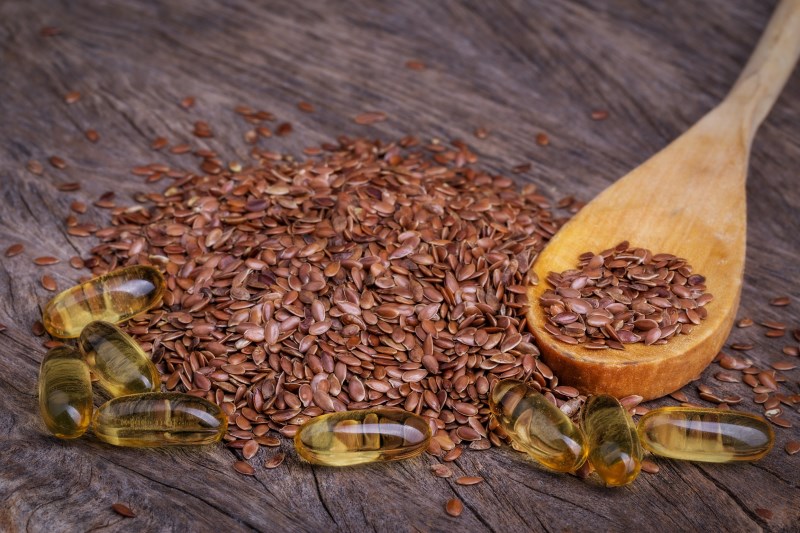
Phytic Acid
Just like many other seeds, flax seeds contain phytic acid, which is often described as an anti-nutrient due to its properties to limit the absorption of vitamins and minerals, including zinc and iron (81).
However, phytic acid limits the absorption of minerals only in one meal per day, which means mineral absorption in all subsequent meals is not impaired by the acid.
Therefore, individuals with any mineral deficiencies should keep this side effect of flax seeds in mind when calculating their daily intake of minerals and vitamins.
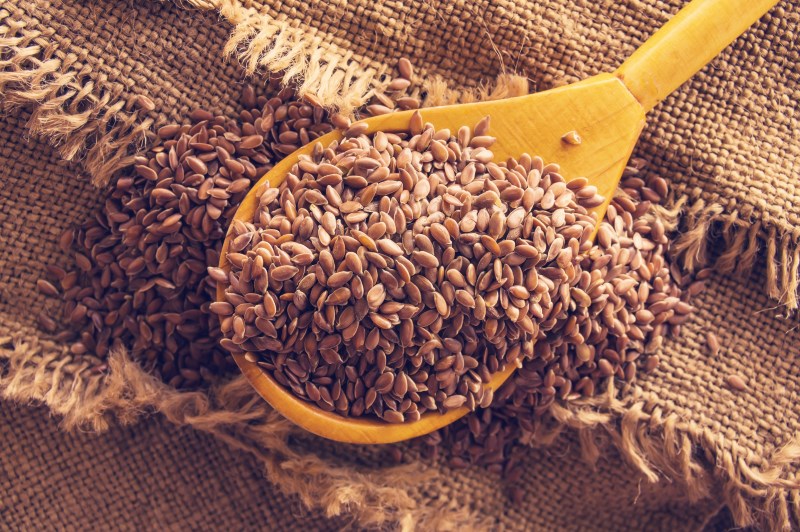
Digestive Problems
Individuals who have never eaten large quantities of fiber should be careful when incorporating flax seeds into their diet.
Too large a quantity of flax seeds may cause digestive problems, including gas, bloating, nausea, and abdominal pain (82).
Therefore, it’s recommended to incorporate flax seeds into the diet starting with small doses and gradually increase them by up to two tablespoons per day.
Furthermore, flax seeds may increase bowel movement frequency because the seeds serve as a natural laxative due to their high content of the insoluble fiber.
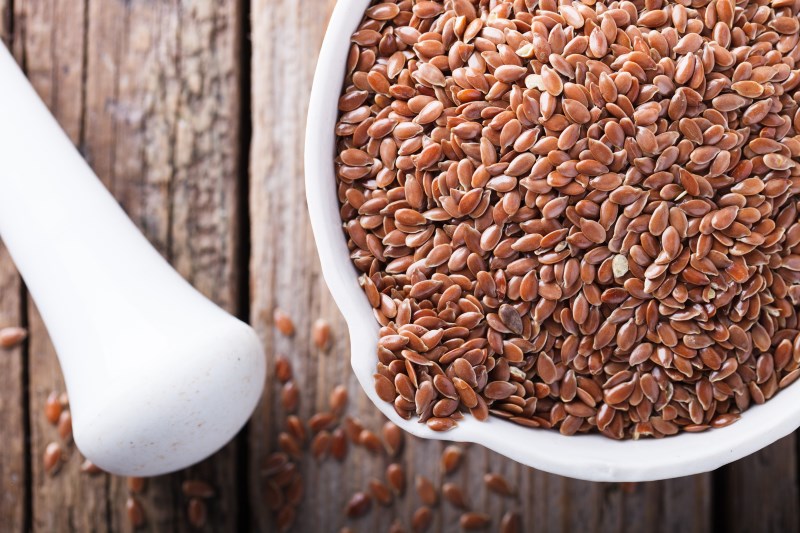
Risks for the Pregnant
Many nutrition experts are concerned that consuming flax seeds may have negative effects on pregnancy.
As a result, it’s not recommended to include flax seeds in the diets of pregnant women until these concerns are confirmed or dismissed in human studies.
Nutrition experts are mainly concerned that the phytoestrogens that are found in flax seeds may have similar effects to those of the female sex hormone estrogen (84).
Animal studies have found that if pregnant women consume flax seeds during early pregnancy, they risk to negatively affect the development of their child’s reproductive system, as well as the offspring’s body weight (85, 86).
Therefore, it’s recommended to significantly limit the intake of flax seeds during pregnancy and lactation.
Brief summary: flax seeds, especially if eaten in large quantities, may cause digestive problems including gas, bloating, nausea, and abdominal pain.
Flax seeds may also inhibit the thyroid gland function and limit the absorption of vitamins and minerals.
Conclusion
Incorporating flax seeds into your diet is a great way to increase the intake of fiber, omega-3 fatty acids, thiamine (vitamin B1), magnesium, copper, as well as many other minerals and plant compounds.
Thanks to their rich content of minerals and plant compounds, flax seeds offer a wide spectrum of health benefits including improving heart health, preventing various types of cancer, improving digestion, and many others.
However, there is a number of risk factors to consider before incorporating flax seeds into the diet.
In particular, flax seeds shouldn’t be eaten in large quantities.
FDA Compliance
The information on this website has not been evaluated by the Food & Drug Administration or any other medical body. We do not aim to diagnose, treat, cure or prevent any illness or disease. Information is shared for educational purposes only. You must consult your doctor before acting on any content on this website, especially if you are pregnant, nursing, taking medication, or have a medical condition.
HOW WOULD YOU RATE THIS ARTICLE?
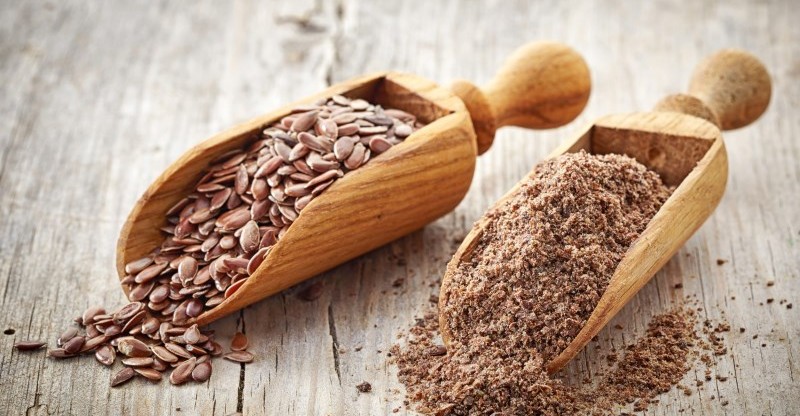






Never really knew anything about these flax seeds. Thanks for the lowdown!
You’re welcome, Lori!
Very informative article! Thanks! But what amount of seeds exactly should I consume daily?
Thank you for the post Helen!
Is it true that heating can damage flax seeds and make them useless? Are Omega-3 fatty acids in flax seeds volatile?
Do you think my kids will not like salads if i’ll be putting there a spoon of flax seeds??? Thansk for the great article!!!!
Hello Amy! You can always try, maybe they’ll enjoy it!:)
Put em in a coffe grinder, then sprinkle on. I wouldnt be w/o em. Love them! I put in avacodo dips, salads, etc etc.
I heard flaxseeds can also help dogs improve digestion, is it true? How can I give my dos the seeds? For how long?
I saw flax seeds oil sold in capsules, are they still beneficial? It would be easier to take capsules instead of cooking with seeds. I just don’t have time to cook, unfortunately.
Can I incorporate flaxseeds to my child’s diet? He’s 8 now. And what is the best way to give them to my son? Should I cook or give them raw?
For how long can I store flax seeds? And what condition of storing should I keep?
Please where can I get flaxseed? I live in Abuja. Thanks for this highly educative article.
I never thought about Flax having Phytic acid in it! I don’t think I have any mineral deficiencies, but don’t want to get any and do try to limit my intake of Phytic acid normally, so I wonder how much Flax I can now safely have? I mainly use ground Flax in my kefir as a prebiotic, because I don’t really like to eat many of the other prebiotic foods (Except for garlic and onions mainly), so was hoping the Flax would help to top up my daily amount of prebiotic fibre. But now I’m not sure if it’s good or not to have the Flax! I also really enjoy it on my porridge in the morning and was even soaking the oats, to try to get rid of a lot of the Phytic acid, but now I find out the Flax also contains it!
Linseed Benefits for Skin:-
Flax seeds are good for your body skin is also beneficial for your facial skin especially when you have acne problem.
Make a face pack of flaxseed oil, curd and besan. Mix well and apply it on your face. R
Rinse after sometime to notice how soft and supple your facial skin has become.
Repeat the exercise before retiring to bed and you will note that your T-zone is clean and fresh when you wake up in the morning.